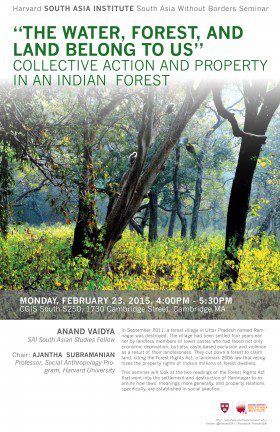South Asia Without Border Seminar
Anand Vaidya, SAI South Asian Studies Fellow
Chair: Ajantha Subramanian, Professor, Social Anthropology Program, Harvard University
Q+A with Anand Vaidya: The politics of conservation
In September 2011, a forest village in Uttar Pradesh named Ramnagar was destroyed. The village had been settled four years earlier by landless members of lower castes who had faced not only economic deprivation, but also caste-based exclusion and violence as a result of their landlessness. They cut down a forest to claim land, citing the Forest Rights Act, a landmark 2006 law that recognizes the property rights of India’s millions of forest dwellers. The higher caste men from a neighboring village who attacked Ramnagar in 2011 were, however, able to cite the same Forest Rights Act as they destroyed the village’s huts and fields.
This paper looks at the two readings of the Forest Rights Act that went into the settlement and destruction of Ramnagar to examine how laws’ meanings more generally, and property relations specifically, are established in social practice. In looking at these contradictory interpretations of the Forest Rights Act, Vaidya makes two linked arguments: First, that collective action, whether by crowds or by the police, is necessary to establish the meaning of laws generally and property relations specifically. Secondly, Vaidya argues that these collective contests over people’s property relations with their environment are simultaneously contests over people’s relations with other people. The contests over Ramnagar’s land are contests over what the forest is—whether, for example, it is a place that should or should not include people. These are contests over who should and should not have access to the forest’s land and trees, and how the people who do and do not have access should relate to one another.

